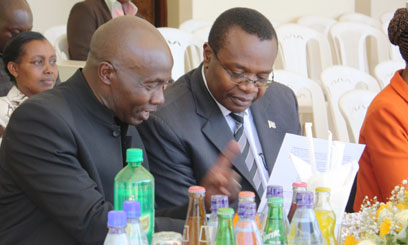Speaking at the graduation ceremony for the inaugural class of 800 interns part of the Kenya Youth Empowerment Project (KYEP), Minister for Youth Affairs and Sports Paul Otuoma acknowledged the great work that the Kenya Private Sector Alliance (KEPSA) has done in alleviating the unemployment problem in the country.
“Currently, the youth population aged between 18 and 35 years stands at about 12 million people, and they account for 67 percent of the unemployed population,” he stated.
“In addition, 750,000 young people graduate from educational institution to join an economy that can only absorb about 500,000 people per annum, mostly in the private sector,” he revealed.
KEPSA has been mandated by the government to implement Component 2 of the internship project, which is a pilot program that lasts six months, with training being split equally between the workplace and a third party internship provider.
The project has three components totaling US$60 million (Sh4,968,170,093.22): labour-intensive works and social services (US$43 million), coordinated by the Office of the Prime Minister (OPM); private sector internships and training (US$15.5 million), managed by the Kenya Private Sector Alliance (KEPSA); and capacity-building and policy development (US$1.5 million), implemented by the Ministry of Youth and Sports.
Otuoma emphasised the importance of providing vocational training to the country’s young people saying “92 percent of the unemployed youth have formal education but no vocational skills training and this means that unemployment is not just limited to employment opportunities, but also a lack of skills to warrant employment.”
He announced that his ministry is implementing various strategies and programmes aimed at preparing the youth for productive livelihoods.
“We’ve set up Youth Empowerment Centres in every constituency so that young people can access information on issues affecting them, allowing them to tap into their talents to create productive employment opportunities,” he explained.
“A total of 109 Youth Empowerment Centres are complete and 21 more are currently being built,” he added.
KEPSA Chairman, Patrick Obath acknowledged that for the country to generate any additional jobs, the GDP must be above 10 percent and challenged the youth to take charge and be more proactive in creating jobs.
“This is the beginning of a great opportunity that has been presented to you, so you can become productive in your own right rather than waiting for the government to give you something to do,” he stressed.
Otuoma reiterated the Chairman’s statements, advising the youth to change their mindset from seeking formal employment to cultivating an entrepreneurial attitude that will see them start their own businesses.
However, he acknowledged that certain interventions must be increased by all stakeholders to address the youth unemployment challenge.
He revealed that the government has invested heavily in youth polytechnics by developing and implementing a new curriculum, constructing and refurbishing the infrastructure of youth polytechnics, providing subsidized youth polytechnic tuition and supplying equipment and tools to 422 youth polytechnic centres.
“To date, Sh700 million has been used to rehabilitate and commission 53 projects in youth polytechnics countrywide and in the 2011-12 financial year, Sh871 million will be spent to pay subsidized tuition for 57,000 trainees in public youth polytechnics,” he declared.
“We have also procured and distributed tools and equipment worth over Sh800 million to 422 youth polytechnics countrywide,” he added.
To add youth interest in agriculture, the government has set up 128 greenhouses in youth polytechnics across the country to train young people in agri-business courses.
“This programme has shown a great potential of creating jobs and generating high income,” he acknowledged.
KEPSA CEO Carole Kariuki revealed that internships will be provided in the six sectors for growth within Vision 2030; Energy, Finance, Tourism, ICT, Manufacturing and Micro and Small Enterprises.
“We are also trying to expand to other locations; we’ve opened an office in Mombasa, where the second cycle is planned for the second quarter of 2012 and the third cycle is planned to take place in Kisumu in early 2013,” she announced.
One hundred and twenty of the 800 interns who participated in the program have received job offers with either their current internship providers or other employers, and KEPSA projects that at least 50 percent of the interns will have jobs or start their own businesses within 6 months of completing their internships.



































